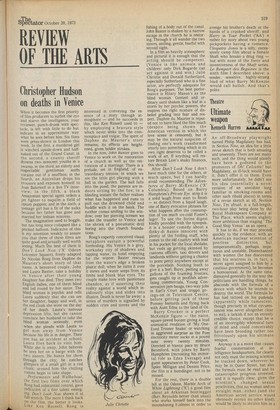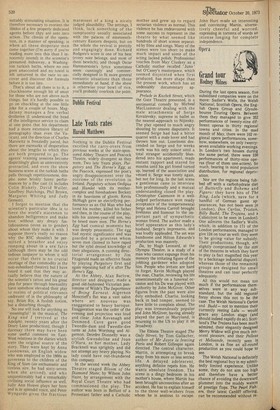Theatre
Ultimate weapon
-Kenneth Hurren An off-Broadway playwright named Philip Magdalany has had, in Section Nine, an idea for a little revue sketch that is both amusing and unseemly. There are not many such, and the thing would plainly have been a godsend to the promoters of Oh! Calcutta! but Magdalany, as ill-luck would have it, didn't offer it to them. Even more unfortunately, he didn't see his idea (essentially a novel revision of an anecdote long
familiar in smoking-rooms and other such ribald places) in terms
of a revue sketch at all. Section Nine, I'm afraid, is a full-length, two-hour play being done by the
Royal Shakespeare Company at The Place, which seems slightly more ambitious than staging The Good Ship Venus' as an opera.
It has to do, if we may proceed quickly to the evidence, with an
American nuclear scientist of peerless distinction but temperamentally, perhaps, impe tuous and unstable. Disenchanted
with women (he has discovered that his mistress is, in fact, a secret agent assigned to him by a
cautious government), he becomes a homosexual. At the same time, dismayed generally by the way the
politicians are handling things, he absconds with the formula of a
device with which he intends to destroy the world. The formula he has had tattoed on his pudenda (apparently while tumescent, though precisely in what circumstances was never altogether clear to me), a larkish if not an entirely credible choice, except that he is of an incorrigibly whimsical turn of mind and could conceivably have been brooding rather too frivolously upon his ultimate weapon.
Anyway it is a move that causes fearful consternation at in telligence headquarters, for clearly not only must the missing scientist be tracked down, wherever he may be in Queer Street, but also the formula must be read and its catastrophic progress arrested; and it is equally clear, given the scientist's changed 'sexual proclivities, that no woman and no straight man, either (and the American secret service would obviously recruit no other kind). would be likely to involve him in a
suitably stimulating situation. It is therefore necessary to reorient the libidos of a few properly dedicated agents before they are sent into action. The climax of the operation, in a manner of speaking, is when all these desperate men come together (I'm sorry if you're reading more into this than I innocently intend) in the scientist's presumed hideaway, a Washington turkish baths, where no one goes unaccosted and no towel is left unturned in the race to uncover and discover the formula before it is too late.
That's about all there is to it, a chucklesome enough bit of smut for those who are not above such things, but it's hardly possible to go on chuckling at the one little joke for a couple of hours. Magdalany manages a few verbal drolleries (I understood the head of the intelligence service to claim at one point that his department had a more extensive library of pornography than even the Vatican), and the direction of Charles Marowitz is frenziedly paced, but there are earmarks of desperation about the lengths to which they are both prepared to go. The agents' training sessions become dispiritingly glum as uninventively protracted, and even the show business scene at the turkish baths palls through repetitiousness, despite some briskly funny performances by a fine cast (it includes Colin Blakely, David Waller, Geoffrey Hutchings, Phil Brown, Margaret Whiting and Judy Geeson).
I forgot to mention that the scientist's particular idea is to force the world's statesmen to abandon belligerence and make love, without any dreary fastidiousness (even as to gender) about whom they make it with. I suppose there's really no reason why the RSC shouldn't be permitted a breather and enjoy romping about in a sex farce (although there may be the odd tedious taxpayer to whom it will occur that there is no crucial shortage of that commodity in the non-subsidised theatre); but I have heard it said that they may actually believe that the nature of the scientist's tattoo and his great plea for peace through bisexuality have somehow elevated their play to realms of political relevance undreamt of in the philosophy of say, Brian Rix. A foolish notion, but a disturbing thought.
No one will look for anything so 'meaningful' in the musical, The King and I (revived at the Adelphi, twenty years after the Drury Lane production), though I daresay there may have been some useful comment on EastWest relations in the diaries which were the original source of the story. They were kept by Anna Leonowens, an English widow who was employed in the 1860s as governess to the children of the King of Siam (an enthusiastic and tireless sire, he had sixty-seven when she arrived), and who unquestionably had a remarkably civilising social influence as well. Sally Ann Howes plays her here and is in splendid voice, and Peter Wyngarde gives the fractious
marmoset of a king a nicely judged plausibility. The settings, I think, lack something of the sumptuosity usually associated with the palaces of nineteenthcentury Eastern despots, but on the whole the revival is prettily and engagingly done. Richard Rodgers's score is one of his best (every note belongs, and most of them bewitch), and though Oscar Hammerstein's lyrics sometimes seem cunningly and commercially designed to fit more general romantic situations than those immediately at hand, if the show is otherwise your bowl of rice, you'll probably overlook the point.



































































 Previous page
Previous page